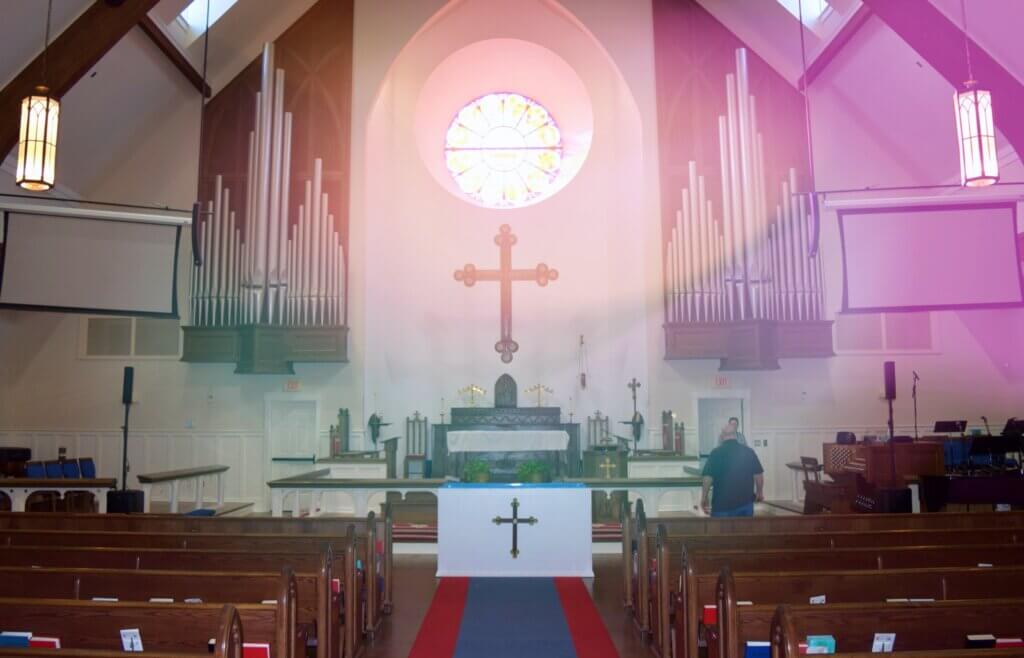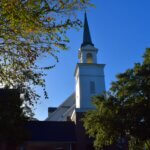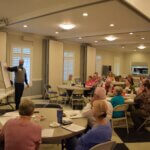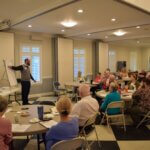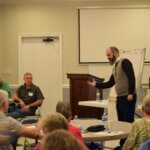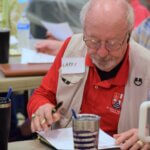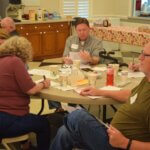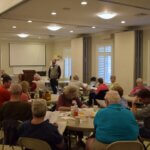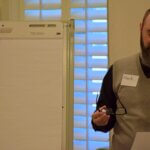On Saturday, November 18th, the Rev. Canon Mark Eldredge visited St. Paul’s Anglican Church, Conway, SC where the Rev. Jason Collins has been the rector for seven and a half years. Canon Mark followed up a Revive weekend in August with this Reframe workshop to further define the parish’s goals for ministry through small group work, large group discussions and teaching, and one-on-one consulting.
While there, the AAC team interviewed Rev. Jason about Anglican Revitalization Ministries and the fruit of the Reframe as well as the parish’s partnership with Anglican Futures UK, an organization dedicated to helping clergy and laity in the Church of England find spiritual homes apart from the established Church. Anglican Futures is closely associated with the American Anglican Council, and we wanted to share this church’s story of connection to a ministry across the pond. This is our interview.
Question: How did you get connected with Canon Mark Eldredge?
Rev. Jason: Ron Greiser, rector of the Church of the Resurrection in Surfside Beach and my dean, is one of my closest friends. He had contacted Mark about doing a Revive weekend late in 2022. I thought that’s exactly what we needed to do here. I’m a city planner by education. So, this type of planning is in my vocabulary, but it’s hard to do from the inside. It takes an outside, open perspective to lead organizations through change. In talking with Ron, I thought we could both do workshops while Mark was in the area, but I realized there was no way he could do two churches at one time. Plus, I wasn’t ready to start as soon as Ron. So, I put it in the budget for 2023 and reached out to Mark to schedule a Revive weekend. We did Revive at the end of August and had him back this week for a follow-up strategic planning meeting.
Question: Were there any main struggles, conflicts, or issues that St. Paul’s was trying to resolve these past couple of years?
Rev. Jason: I think the main one was a lack of focus. When I first arrived as a rector seven and a half years ago, I felt like I was part of the solution because I was coming back into basically my home church. I had been away for a little while, so I had fresh eyes. But after being the rector for seven and a half years, I felt that I’d been in the system long enough to be part of the problem! I no longer had a fresh perspective. The tyranny of the urgent drew my attention away from long term planning. Then the pandemic hit, and we lost some momentum. So, I think the loss of focus and momentum made us realize it was time to get back on a growth track.
Question: How did this follow up weekend fit in?
Rev. Jason: Since our Revive weekend, we’ve tweaked our vision, looked at our core values and worked on a lot over the past few months. This weekend was the next step in determining who God was calling us to minister to. In the past, we’ve taken more of a shotgun approach, trying to do too much, and not doing any of it very well. So, we needed more help focusing on what God has gifted and called us to do. This kind of hands-on help drew me to Revive because I think without accountability and follow up, an event can energize people for a little while but ends up having no significant impact on the church.
Question: So, what kind of forward momentum emerged? Any new ministry ideas or calls that you feel God might be placing on the church?
Rev. Jason: I think we rediscovered what we already knew but were able to all agree on it, which is helpful. Because our area of the city is growing quickly, it became obvious that we need to reach out to new people that are coming into the community. That’s who we have been, even though our church is 113 years old now. We’re not your typical downtown, southern church full of matriarchs and patriarchal families that have been here for 100 years. I would say 85% of our congregation is not from Conway, and they weren’t Anglican when they got here. We’ve been helping transplants, but we’ve never named it or focused in on it purposefully.
Also, we have a preschool with about 70 families, and those kids are here five days a week. But there’s very little connection or interaction between the day school and the church. When we started the preschool, the previous rector’s wife was a teacher, and all the teachers were members of the church. Now, the faculty aren’t members at all. So, there’s a huge disconnect. They’re doing a great job teaching the basics, preparing the kids to learn, and teaching them the Gospel, but because they’re not members, they don’t see the importance of inviting these families to St. Paul’s. So, through our workshop, we came up with strategies to reintegrate that ministry back into the church.
Question: We’ve heard one of the other ministries you’re passionate about is global outreach and that St. Paul’s is connected to our friends and ministry partners at Anglican Futures in the UK. How did you connect with them? Why did you choose to support them?
Rev. Jason: When I started reading about all the rumblings in the Church of England when they had their synod meeting in February, I had PTSD from our own struggles coming out of the Episcopal Church. I thought, “I know what’s coming.” They’re getting ready to do what we experienced in the late 90s and early 2000s here in the States. When we went through our church split, 25% of our congregation didn’t have any problem with the theological direction of the Episcopal Church, or they were cradle Episcopalians who couldn’t imagine worshiping anywhere else, or they wanted to worship with their friends. That crowd left our parish and took much of the funding we depended on. It was a hard time for us. But there were churches in our diocese and other churches that knew what we were experiencing, and they came to our aid financially and spiritually. So, I thought we could pay it forward to our friends in England who are entering that same struggle, but I didn’t know exactly how to do that. We had done missions before, partnering with churches in Haiti and Peru, so we felt we could make an impact in England by going over there ourselves. But a vestry member who had been a missionary suggested that instead of spending money on travel, we could support them financially to meet their immediate needs.
The vestry was on board, and our bishop suggested we call the AAC and talk to Canon Phil Ashey because he would know a ministry in the UK that needed help. He put us in contact with several different ministries there, and he shared our desire to help with several ministries as well. Susie Leafe, one of the directors of Anglican Futures, was the first to respond. We looked at Anglican Futures and their mission. Their “On the Edge” weekend workshop for clergy and lay leaders in the Church of England who want to leave the established church seemed like a good fit. I had some email conversations with Susie who put me in touch with her rector to talk more about the needs of parishes in England who are on their own. He said to me, “If you help Anglican Futures, you are casting a broad net that’s going to help a lot of people.” That spoke to me, so our vestry, Susie Leafe, and I met on Zoom to learn about the mission and ministry of Anglican Futures. I reminded the vestry that this was exactly what we had needed when we were coming out of TEC. It was a good fit, and we decided to move forward.
Question: How did you raise money for Anglican Futures?
Rev. Jason: We decided to host a dinner at a vestry member’s house. We made it clear it was a fundraiser dinner. We had about 25 people show up. Our bishop, Chip Edgar, was also visiting and said he would take up a collection to give to Anglican Futures rather than take it for himself. We also had some other mission money we had not spent yet. So, we were able to send about $20,000 to Anglican Futures which funded four “On the Edge” weekends for clergy. I believe that Anglican Futures may have been able to hire a part time administrative assistant with the funds as well. We felt this was a good way to pay it forward, to encourage them, to let people in England know that they’re not alone, and that there is life on the other side.
If you would like to learn more about Anglican Revitalization Ministries or to schedule a visit from Canon Mark to your own parish, visit www.churchrevive.org where you can sign up for a free consultation. To find out more about Anglican Futures UK and how you can support their ministry, visit www.anglicanfutures.org.

